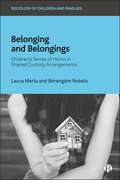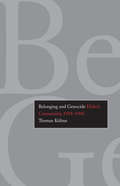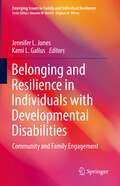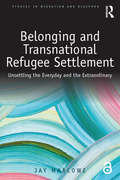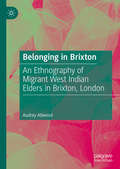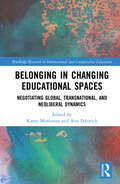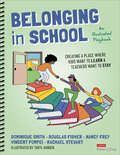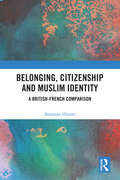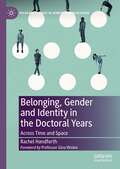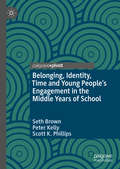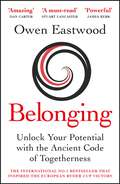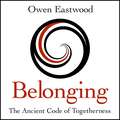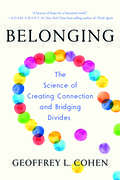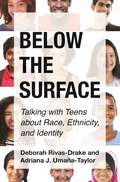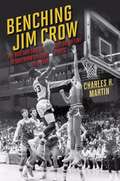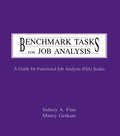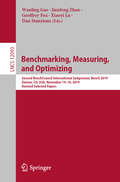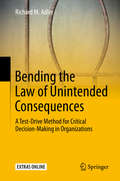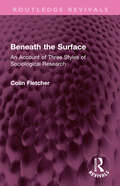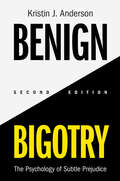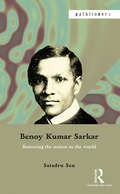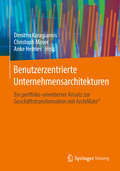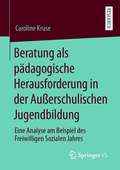- Table View
- List View
Belonging and Belongings: Children’s Sense of Home in Shared Custody Arrangements (Sociology of Children and Families)
by Laura Merla Bérengère NobelsAvailable open access digitally under CC-BY-NC-ND licence. Based on in-depth fieldwork with Belgian children aged 10 to 16, this book examines how children in shared physical custody define and negotiate their place within the household of each parent. The authors analyse how family practices within and between each dwelling shape children’s sense home, and the strategies and skills children develop to manage and position themselves in these different environments. Challenging common stereotypes and giving voice to children in shared custody, the book provides valuable insights for practitioners and scholars to better understand and support children and their parents.
Belonging and Genocide
by Thomas KühneNo one has ever posed a satisfactory explanation for the extreme inhumanity of the Holocaust. What enabled millions of Germans to perpetrate or condone the murder of the Jews? In this illuminating book, Thomas Kühne offers a provocative answer. In addition to the hatred of Jews or coercion that created a genocidal society, he contends, the desire for a united “people’s community” made Germans conform and join together in mass crime. Exploring private letters, diaries, memoirs, secret reports, trial records, and other documents, the author shows how the Nazis used such common human needs as community, belonging, and solidarity to forge a nation conducting the worst crime in history.
Belonging and Resilience in Individuals with Developmental Disabilities: Community and Family Engagement (Emerging Issues in Family and Individual Resilience)
by Jennifer L. Jones Kami L. GallusThis book examines belonging as a key protective factor for enhancing resilience for individuals with intellectual and developmental disabilities and their families. It focuses on understanding intellectual and developmental disabilities and resilience from systemic and social-ecological perspectives, emphasizing the roles of professionals, families, and communities in combating long-standing segregation and health disparities experienced by individuals and families. The volume explores the dimensions of belonging across diverse professional fields using a person-centered approach that acknowledges the significant lifelong role of family members and emphasizes reflective practice for professionals. Chapters present research and innovative strategies to facilitate belonging when working alongside individuals and families.Key areas of coverage include: Family-professional partnerships in working with individuals with intellectual and developmental disabilities across lifespan and community contexts. Spirituality, mental health, and identity in persons with intellectual and developmental disabilities. Research ethics and design in working with individuals with intellectual and developmental disabilities. The diverse needs, desires, and preferences of individuals with intellectual and developmental disabilities. The importance of individualized planning and approaches in fostering belonging for individuals with intellectual and developmental disabilities. Belonging and Resilience in Individuals with Developmental Disabilities is a valuable resource for researchers, professors, and graduate students as well as clinicians, therapists, and related professionals in developmental psychology, family studies, public health, and social work as well as related disciplines, including education policy and politics, behavioral health, and psychiatry.
Belonging and Transnational Refugee Settlement: Unsettling the Everyday and the Extraordinary (Studies in Migration and Diaspora)
by Jay MarloweThe Open Access version of this book, available at http://www.taylorfrancis.com/books/e/9781315268958, has been made available under a Creative Commons Attribution-Non Commercial-No Derivatives 4.0 license. The image we have of refugees is one of displacement – from their homes, families and countries – and yet, refugee settlement is increasingly becoming an experience of living simultaneously in places both proximate and distant, as people navigate and transcend international borders in numerous and novel ways. At the same time, border regimes remain central in defining the possibilities and constraints of meaningful settlement. This book examines the implications of ‘belonging’ in numerous places as increased mobilities and digital access create new global connectedness in uneven and unexpected ways. Belonging and Transnational Refugee Settlement positions refugee settlement as an ongoing transnational experience and identifies the importance of multiple belongings through several case studies based on original research in Australia and New Zealand, as well as at sites in the US, Canada and the UK. Demonstrating the interplay between everyday and extraordinary experiences and broadening the dominant refugee discourses, this book critiques the notion that meaningful settlement necessarily occurs in ‘local’ places. The author focuses on the extraordinary events of trauma and disasters alongside the everyday lives of refugees undertaking settlement, to provide a conceptual framework that embraces and honours the complexities of working with the ‘trauma story’ and identifies approaches to see beyond it. This book will appeal to those with an interest in migration and diaspora studies, human geography and sociology.
Belonging in Brixton: An Ethnography of Migrant West Indian Elders in Brixton, London
by Audrey AllwoodThis volume provides a unique perspective on elderly working-class West Indian migrants in the UK, particularly examining how they negotiate their sense of belonging. Utilizing the life span gaze and including elements of oral history and narrative, this ethnography provides rich insight into the ordinary lives, migratory circumstances, social networks, and interactions with the state as residents in a sheltered housing scheme in Brixton, London. The author further compiles a variety of genealogy charts, providing a uniquely vivid scholarly analysis of the Caribbean migrant experience both in a “place” and through space and time. Ultimately, this work contemplates how communities face change whilst at once developing a local symbolic cultural site, navigating adaptation to new economic and social environments.
Belonging in Changing Educational Spaces: Negotiating Global, Transnational, and Neoliberal Dynamics (Routledge Research in International and Comparative Education)
by Karen Monkman Ann FrkovichThis book explores the impacts on personal and professional, local and global forms of belonging in educational spaces amidst rapid changes shaped by globalization. Encouraging readers to consider the idea of belonging as an educational goal as much as a guiding educational strategy, this text forms a unique contribution to the field. Drawing on empirical and theoretical analyses, chapters illustrate how educational experience informs a sense of belonging, which is increasingly juxtaposed against a variety of global dynamics including neoliberalism, transnationalism, and global policy and practice discourses. Addressing phenomena such as refugee education, large-scale international assessments, and study abroad, the volume’s focus on ten countries including Japan, Sierra Leone, and the US demonstrates the complexities of globalization and illuminates possibilities for supporting new constructions of belonging in rapidly globalizing educational spaces. This text will benefit researchers, academics, and educators with an interest in international and comparative education, multicultural education, and educational policy more broadly. Those interested in the sociology of education and cultural studies within education will also benefit from this volume.
Belonging in School: Creating a Place Where Kids Want to Learn and Teachers Want to Stay--An Illustrated Playbook
by Douglas Fisher Nancy Frey Dominique Smith Rachael Stewart Vincent PompeiUnlock a treasure trove of learning—make room for belonging in school Belonging is an instinctual feeling: you know when you feel it—and you really know when you don’t. Creating a sense of belonging in the classroom has a significant impact on student learning and well-being; it serves as a gatekeeper for other aspects of learning to take root. But how do we create classrooms and schools where every student knows they belong? This easy-to-use, illustrated playbook has you covered. 11 evidence-based modules feature actions and strategies that teachers can apply to help students feel more included. Interactive features such as essential questions and reflective prompts are designed to engage educators and deepen their understanding of the importance of connection and belonging in a student′s educational experience. Readers will find Detailed coverage of the 11 dimensions of belonging Evidence-based actions in every module to help foster belonging, balanced between elementary and secondary levels Interactive features like Essential Questions, Two Truths and a Lie, Case in Point, What′s Your Advice? and What′s Next? to facilitate engagement and reflection A highly visual illustrated style to promote comprehension and information retention By utilizing this playbook’s strategies to create environments where students feel a sense of belonging, educators can help improve learning outcomes and academic performance while supporting the overall well-being of their students.
Belonging in School: Creating a Place Where Kids Want to Learn and Teachers Want to Stay--An Illustrated Playbook
by Douglas Fisher Nancy Frey Dominique Smith Rachael Stewart Vincent PompeiUnlock a treasure trove of learning—make room for belonging in school Belonging is an instinctual feeling: you know when you feel it—and you really know when you don’t. Creating a sense of belonging in the classroom has a significant impact on student learning and well-being; it serves as a gatekeeper for other aspects of learning to take root. But how do we create classrooms and schools where every student knows they belong? This easy-to-use, illustrated playbook has you covered. 11 evidence-based modules feature actions and strategies that teachers can apply to help students feel more included. Interactive features such as essential questions and reflective prompts are designed to engage educators and deepen their understanding of the importance of connection and belonging in a student′s educational experience. Readers will find Detailed coverage of the 11 dimensions of belonging Evidence-based actions in every module to help foster belonging, balanced between elementary and secondary levels Interactive features like Essential Questions, Two Truths and a Lie, Case in Point, What′s Your Advice? and What′s Next? to facilitate engagement and reflection A highly visual illustrated style to promote comprehension and information retention By utilizing this playbook’s strategies to create environments where students feel a sense of belonging, educators can help improve learning outcomes and academic performance while supporting the overall well-being of their students.
Belonging, Citizenship and Muslim Identity: A British-French Comparison
by Stéphane HlaimiThis book explores belonging among Muslims in Britain and France, asking whether British and French Muslims are citizens first or Muslims first. Based on in-depth interviews with Muslims in both jurisdictions, it considers three options open to Muslims – assimilation, integration, or conflict – and considers the differences in approach that tend to prevail among Muslims in Britain and France, with British Muslims tending to favour a cohabitationist strategy, while many French Muslims adopt a more conflictual approach.With attention to issues of Islamophobia, the author examines the crises multiculturalism and secularism are facing, and argues for a more inclusive rhetoric on questions of Islam and citizenship, to counter the essentialist, ‘othering’ approach that characterises media coverage and public discourse.A call for a new paradigm of articulation between Muslim identity and Western citizenship, Belonging, Citizenship and Muslim Identity will be of interest to scholars of sociology, politics, geography and anthropology with interests in inclusion and diasporic communities.
Belonging, Gender and Identity in the Doctoral Years: Across Time and Space (Palgrave Studies in Gender and Education)
by Rachel HandforthThis book uses belonging as a lens through which to understand women students’ experiences of studying for a doctorate, exploring the impact of academic cultures on career aspirations. Drawing on discourses of neoliberalism and academic identities, it makes a valuable contribution to ongoing discussions of gender inequality in the academy. Based on data gathered from women doctoral students in the UK, this book offers a contemporary, research-informed understanding of the doctorate as an inherently gendered experience, which has implications for individuals, academic institutions, and for the future of the academic sector. The book will be of interest to academics working in the area of doctoral education, doctoral supervisors and those involved in doctoral student support, including researcher developers and individuals working in graduate schools, as well as doctoral students themselves.
Belonging, Identity, Time and Young People’s Engagement in the Middle Years of School
by Peter Kelly Seth Brown Scott K. PhillipsThis book explores the complex ways in which belonging, identity and time are entangled in shaping young people engagement with the middle years of school. The authors argue that these ‘entanglements’ need to be understood in ways that move beyond a focus on why individual young people engage with the middle years. Instead, there should be a focus on the socio-ecologies of particular places, and the ways in which these ecologies shape the possibilities of young people engaging productively in the middle years. Drawing on extensive qualitative data from an outer-urban metropolitan context, this book will appeal to scholars of sociology, education and policy studies.
Belonging: The Ancient Code of Togetherness
by Owen EastwoodTHE #1 INTERNATIONAL BESTSELLERWhakapapa. You belong here.Whakapapa is a Maori idea which embodies our universal human need to belong. It represents a powerful spiritual belief - that each of us is part of an unbroken and unbreakable chain of people who share a sacred identity and culture.Owen Eastwood places this concept at the core of his methods to maximise a team's performance. In this book he reveals, for the first time, the ethos that has made him one of the most in-demand Performance Coaches in the world.In Belonging, Owen weaves together insights from homo sapiens' evolutionary story and ancestral wisdom. He shines a light on where these powerful ideas are applied around our world in high-performing settings encompassing sport, business, the arts and military.Aspects of Owen's unique approach include: finding your identity story; defining a shared purpose; visioning future success; sharing ownership with others; understanding the 'silent dance' that plays out in groups; setting the conditions to unleash talent; and converting our diversity into a competitive advantage.
Belonging: The Ancient Code of Togetherness: The International No. 1 Bestseller
by Owen EastwoodWhakapapa. You belong here.Whakapapa is a Maori idea which embodies our universal human need to belong. It represents a powerful spiritual belief - that each of us is part of an unbroken and unbreakable chain of people who share a sacred identity and culture.Owen Eastwood places this concept at the core of his methods to maximise a team's performance. In this book he reveals, for the first time, the ethos that has made him one of the most in-demand Performance Coaches in the world.In Belonging, Owen weaves together insights from homo sapiens' evolutionary story and ancestral wisdom. He shines a light on where these powerful ideas are applied around our world in high-performing settings encompassing sport, business, the arts and military.Aspects of Owen's unique approach include: finding your identity story; defining a shared purpose; visioning future success; sharing ownership with others; understanding the 'silent dance' that plays out in groups; setting the conditions to unleash talent; and converting our diversity into a competitive advantage.(P)2020 Quercus Editions Limited
Belonging: The Ancient Code of Togetherness: The book that inspired the England football team
by Owen EastwoodTHE #1 INTERNATIONAL BESTSELLER'Gareth Southgate's secret weapon' - Guardian'A copy of Eastwood's new book, Belonging, was given to every England player when they reported for duty at the European Championships' - Telegraph'How Maori belief is driving the England team to seize the moment' - Sunday Telegraph'Belonging is a must-read for anyone interested in building a long term high-performing team.' - Stuart Lancaster'One of the wisest books about winning you'll ever read...Powerful lessons beautifully expressed.' - James KerrWhakapapa. You belong here.Whakapapa is a Maori idea which embodies our universal human need to belong. It represents a powerful spiritual belief - that each of us is part of an unbroken and unbreakable chain of people who share a sacred identity and culture.Owen Eastwood places this concept at the core of his methods to maximise a team's performance. In this book he reveals, for the first time, the ethos that has made him one of the most in-demand Performance Coaches in the world.In Belonging, Owen weaves together insights from homo sapiens' evolutionary story and ancestral wisdom. He shines a light on where these powerful ideas are applied around our world in high-performing settings encompassing sport, business, the arts and military.Aspects of Owen's unique approach include: finding your identity story; defining a shared purpose; visioning future success; sharing ownership with others; understanding the 'silent dance' that plays out in groups; setting the conditions to unleash talent; and converting our diversity into a competitive advantage.
Belonging: The Science of Creating Connection and Bridging Divides
by Geoffrey L. CohenFinalist for The Next Big Idea Bookclub • Book of the Year Selection Behavioral Scientist and Greater Good Society “This is perhaps the richest book on belonging you’ll ever read.… The inspiration one draws from every page of this book is an enhanced sense of what is possible. It revives the very thing we need most in these times: hope.” —Claude M. Steele, author of Whistling Vivaldi Discover the secret to flourishing in an age of division: belonging. In a world filled with discord and loneliness, finding harmony and happiness can be difficult. But what if the key to unlocking our potential lies in this deceptively simple concept? Belonging is the feeling of being a part of a group that values, respects, and cares for us—a feeling that we can all cultivate in even the smallest corners of social life. In Belonging: The Science of Creating Connection and Bridging Divides, Stanford University professor Geoffrey L. Cohen draws on his own and others’ groundbreaking scientific research to offer simple, concrete solutions for fostering a sense of belonging. These solutions can generate surprisingly significant and long-lasting benefits. Small but powerful actions can bolster belonging—actions such as encouraging people to reflect on their core values before they face a challenge or expressing belief in someone’s capacity to reach a higher standard. A wide range of innovative approaches have been found to boost achievement at work and at school, bridge political divides, reduce prejudice, and even contribute to overall health. Rigorously tested in diverse arenas—from classrooms to disadvantaged neighborhoods to iconic Silicon Valley companies—these methods offer a path forward in these demanding times. Belonging is a compelling read for all who yearn for a more connected world, whether you’re a manager or employee, an educator or student, a parent or caregiver, or simply someone seeking to make the most out of every moment you spend with others. Packed with actionable insights and specific strategies, this book offers hope and practical guidance, serving as both an inspiration and a roadmap to creating a world of inclusion, understanding, and empathy.
Below the Surface: Talking with Teens about Race, Ethnicity, and Identity
by Deborah Rivas-Drake Adriana Umaña-TaylorA guide to the latest research on how young people can develop positive ethnic-racial identities and strong interracial relationsToday’s young people are growing up in an increasingly ethnically and racially diverse society. How do we help them navigate this world productively, given some of the seemingly intractable conflicts we constantly hear about? In Below the Surface, Deborah Rivas-Drake and Adriana Umaña-Taylor explore the latest research in ethnic and racial identity and interracial relations among diverse youth in the United States. Drawing from multiple disciplines, including developmental psychology, social psychology, education, and sociology, the authors demonstrate that young people can have a strong ethnic-racial identity and still view other groups positively, and that in fact, possessing a solid ethnic-racial identity makes it possible to have a more genuine understanding of other groups.During adolescence, teens reexamine, redefine, and consolidate their ethnic-racial identities in the context of family, schools, peers, communities, and the media. The authors explore each of these areas and the ways that ideas of ethnicity and race are implicitly and explicitly taught. They provide convincing evidence that all young people—ethnic majority and minority alike—benefit from engaging in meaningful dialogues about race and ethnicity with caring adults in their lives, which help them build a better perspective about their identity and a foundation for engaging in positive relationships with those who are different from them.Timely and accessible, Below the Surface is an ideal resource for parents, teachers, educators, school administrators, clergy, and all who want to help young people navigate their growth and development successfully.
Benching Jim Crow: The Rise and Fall of the Color Line in Southern College Sports, 1890-1980 (Sport and Society)
by Charles H. MartinChronicling the uneven rise and slow decline of segregation in American college athletics, Charles H. Martin shows how southern colleges imposed their policies of racial exclusion on surprisingly compliant northern teams and explains the social forces that eventually forced these southern schools to accept integrated competition. Martin emphasizes not just the racism prevalent in football and basketball in the South, but the effects of this discrimination for colleges and universities all over the country. Southern teams such as the University of Alabama, University of Mississippi, and the University of North Carolina were obsessed with national recognition, but their Jim Crow policies prevented them for many years from playing against racially mixed teams from other parts of the country. Devoting special attention to the Southeastern Conference, the Atlantic Coast Conference, and teams in Texas, Martin explores the changing social attitudes and culture of competition that turned the tide and allowed for the recruitment of black players and hiring of black coaches. He takes a close look at the case of Texas Western College (now the University of Texas at El Paso), the first major white university in an ex-Confederate state to recruit African American athletes extensively. Martin skillfully weaves existing arguments and documentation on the integration of college sports with wide-ranging, original research, including previously unpublished papers and correspondence of college administrators and athletic directors uncovered in university archives.
Benchmark Tasks for Job Analysis: A Guide for Functional Job Analysis (fja) Scales (Applied Psychology Series)
by Sidney A. Fine Maury GetkateHuman resource practitioners are repeatedly faced with the challenge of effectively using language to clearly describe the work performed on a job. Functional Job Analysis--an internationally recognized and respected job analysis method --has been meeting this challenge for more than forty years. In this book, the authors show how human resource practitioners can use structured task statements and comprehensive rating scales to gain the perspective needed to map the domain of any job. In response to the demands of human resource practitioners, the book focuses on the seven scales used in Functional Job Analysis. More than 450 structured tasks were used to illustrate the breadth and scope of all the levels of these scales. These tasks can be used effectively as benchmarks to chart the work requirements of virtually any job. Personnel practitioners will find insights into the challenges of job analysis, as well as the tools needed to make job analysis more comprehensive, useful, and effective for human resources. Representing the most comprehensive information to date on the use of Functional Job Analysis scales for rating job tasks, this book: *addresses the problems of using language to clearly describe how work is performed on the job; *describes the relation between the need to carefully control the language of job analysis and the structure inherent in the Functional Job Analysis Worker Function scales--a conceptual link showing the reader that the key to understanding work is in the vocabulary used to describe work; *contains the most comprehensive treatment of the way to write clear and comprehensive task statements available in the job analysis literature; and *contains a sample task bank for the job of Functional Job Analysts--aiding the reader in understanding how a complete Functional Job Analysis should look.
Benchmarking, Measuring, and Optimizing: Second BenchCouncil International Symposium, Bench 2019, Denver, CO, USA, November 14–16, 2019, Revised Selected Papers (Lecture Notes in Computer Science #12093)
by Jianfeng Zhan Geoffrey Fox Wanling Gao Xiaoyi Lu Dan StanzioneThis book constitutes the refereed proceedings of the Second International Symposium on Benchmarking, Measuring, and Optimization, Bench 2019, held in Denver, CO, USA, in November 2019. The 20 full papers and 11 short papers presented were carefully reviewed and selected from 79 submissions. The papers are organized in topical sections named: Best Paper Session; AI Challenges on Cambircon using AIBenc; AI Challenges on RISC-V using AIBench; AI Challenges on X86 using AIBench; AI Challenges on 3D Face Recognition using AIBench; Benchmark; AI and Edge; Big Data; Datacenter; Performance Analysis; Scientific Computing.
Bending the Law of Unintended Consequences: A Test-Drive Method for Critical Decision-Making in Organizations
by Richard M. AdlerThis title provides managers, executives and other professionals with an innovative method for critical decision-making. The book explains the reasons for decision failures using the Law of Unintended Consequences. This account draws on the work of sociologist Robert K. Merton, psychologists Amos Tversky and Daniel Kahneman, and economist Herbert Simon to identify two primary causes: cognitive biases and bounded rationality. It introduces an innovative method for “test driving” decisions that addresses both causes by combining scenario planning and “what-if” simulations. This method enables professionals to learn safely from virtual mistakes rather than real ones. It also provides four sample test drives of realistic critical decisions as well as two instructional videos to illustrate this new method. This book provides leaders and their support teams with important new tools for analyzing and refining complex decisions that are critical to organizational well-being and survival.
Beneath the Surface: An Account of Three Styles of Sociological Research (Routledge Revivals)
by Colin FletcherOriginally published in 1974, this book evaluates and compares three important styles of sociological research: positivism, symbolic interactionism and critique. The book describes and evaluates each research technique as an experience for the researcher, and the author explains what they themselves have learned of sociological meaning from engaging in it. The book traces the main ideas through their last generations of sociologists and asks what future there is in a particular method.
Benign Bigotry: The Psychology of Subtle Prejudice
by Kristin J. AndersonBenign Bigotry delves into the multifaceted landscape of prejudice, spanning academic and scientific research, popular culture, and contemporary politics. At its core lies the concept of subtle prejudice-a pervasive, often unconscious bias in race, gender, and sexuality. Through meticulous analysis and the author's own experience serving eight years on the Police Oversight Board, this book exposes seven seemingly harmless cultural myths that perpetuate inequality. It also confronts prejudices against women and LGBTQ+ individuals, offering concrete strategies to dismantle entrenched beliefs. Designed as a textbook for undergraduate and graduate classes, yet accessible to the educated lay reader, each chapter caters to those interested in psychology, sociology, business, and education. With a valuable new chapter on systemic inequality, updated real-life examples, and engaging with the exploration of empirical research on discrimination and prejudice emerging since 2009, this second edition is not to be missed.
Benoy Kumar Sarkar: Restoring the nation to the world (Pathfinders)
by Satadru SenThis book explores the life and times of the pioneering Indian sociologist Benoy Kumar Sarkar. It locates him simultaneously in the intellectual history of India and the political history of the world in the twentieth century. It focuses on the development and implications of Sarkar’s thinking on race, gender, governance and nationhood in a changing context. A penetrating portrait of Sarkar and his age, this book will be of great interest to scholars and researchers of modern Indian history, sociology, and politics.
Benutzerzentrierte Unternehmensarchitekturen: Ein portfolio-orientierter Ansatz zur Geschäftstransformation mit ArchiMate®
by Dimitris Karagiannis Christoph Moser Anke HelmesUnternehmensarchitektur-Management unterstützt die Planung und Durchführung von Geschäftstransformation. Existierende Ansätze können in portfolio- und projekt-orientierte Ansätze eingeteilt werden. Die Synthese dieser Ansätze bietet das Beste aus beiden Welten. Das Buch stellt den kombinierten Ansatz vor. Der Inhalt gliedert sich in ausgewählte Best-Practice-Szenarien. Der Fokus liegt jeweils auf dem Thema Benutzererfahrung – ein Schwerpunkt, der in Transformationsprojekten oftmals vernachlässigt wird.Zur Evaluierung von Unternehmensarchitekturen aus Sicht der Benutzer steht unter ww.omilab.org/usercentricassessment ein Online-Service zur Verfügung.
Beratung als pädagogische Herausforderung in der Außerschulischen Jugendbildung: Eine Analyse am Beispiel des Freiwilligen Sozialen Jahres
by Caroline KruseBeratung in jugendpädagogischen Handlungsfeldern spielt in der Disziplin Erwachsenenbildung/ Außerschulische Jugendbildung (EB/AJB) eine weitestgehend vernachlässigte Rolle. Insbesondere vor dem Hintergrund des jugendtheoretischen Konsenses über eine Zunahme des Beratungsbedarfs von jungen Menschen beansprucht die Studie von Caroline Kruse, einen professionsorientierten Beitrag zur Profilierung von Beratung in der AJB zu leisten.Das im Rahmen ihrer Untersuchungen aufgenommene empirische Bild der Beratungspraxis im Freiwilligen Sozialen Jahr (FSJ) zeigt: Jugendbildungsreferent*innen werden vermehrt mit beraterischen Anforderungen konfrontiert und aus berufspraktischer Perspektive erfährt Beratung in diesem Handlungsfeld einen deutlichen Bedeutungszuwachs. Die Ergebnisse belegen weiter, dass das FSJ besondere förderliche Rahmenbedingungen aufweist, um auf die (zugenommene) Beratungsbedürftigkeit reagieren zu können. Gleichzeitig fehlt es an institutionellen Anerkennungs- und Unterstützungsformen. Beratung wird damit weitestgehend der individuellen Bereitschaft und des selbst zu verantwortenden Wissens und Könnens der Jugendbildungsreferent*innen überlassen.
